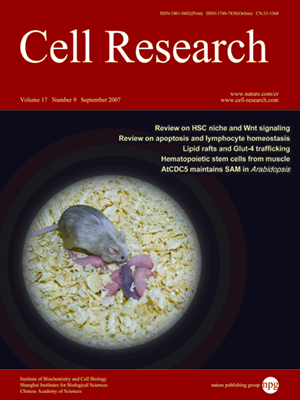
Volume 17, No 9, Sep 2007
ISSN: 1001-0602
EISSN: 1748-7838 2018
impact factor 17.848*
(Clarivate Analytics, 2019)
Volume 17 Issue 9, September 2007: 745-758
REVIEWS
Regulation of hematopoiesis and the hematopoietic stem cell niche by Wnt signaling pathways
Michael J Nemeth and David M Bodine
Hematopoiesis Section, Genetics and Molecular Biology Branch, National Human Genome Research Institute, Building 49, Room 3A18, 49 Convent Dr., MSC 4442, Bethesda, MD 20892-4442, USA
Correspondence: Michael J Nemeth(mnemeth@nhgri.nih.gov)
Hematopoietic stem cells (HSCs) are a rare population of cells that are responsible for life-long generation of blood cells of all lineages. In order to maintain their numbers, HSCs must establish a balance between the opposing cell fates of self-renewal (in which the ability to function as HSCs is retained) and initiation of hematopoietic differentiation. Multiple signaling pathways have been implicated in the regulation of HSC cell fate. One such set of pathways are those activated by the Wnt family of ligands. Wnt signaling pathways play a crucial role during embryogenesis and deregulation of these pathways has been implicated in the formation of solid tumors. Wnt signaling also plays a role in the regulation of stem cells from multiple tissues, such as embryonic, epidermal, and intestinal stem cells. However, the function of Wnt signaling in HSC biology is still controversial. In this review, we will discuss the basic characteristics of the adult HSC and its regulatory microenvironment, the "niche", focusing on the regulation of the HSC and its niche by the Wnt signaling pathways.
Cell Research (2007) 17:746-758. doi: 10.1038/cr.2007.69; published online 4 September 2007
FULL TEXT | PDF
Browse 2159


